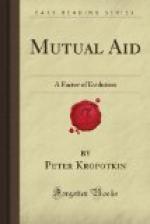40. A. Luchaire, Les Communes francaises, pp, 45-46.
41. Guilbert de Nogent, De vita sua, quoted by Luchaire, l.c., p. 14.
42. Lebret, Histoire de Venise, i. 393; also Marin, quoted by Leo and Botta in Histoire de l’Italie, French edition, 1844, t. i 500.
43. Dr. W. Arnold, Verfassungsgeschichte der deutschen Freistadte, 1854, Bd. ii. 227 seq.; Ennen, Geschichte der Stadt Koeln, Bd. i. 228-229; also the documents published by Ennen and Eckert.
44. Conquest of England, 1883, p. 453.
45. Byelaeff, Russian History, vols. ii. and iii.
46. W. Gramich, Verfassungsund Verwaltungsgeschichte der Stadt Wurzburg im 13. bis zum 15. Jahrhundert, Wurzburg, 1882, p. 34.
47. When a boat brought a cargo of coal to Wurzburg, coal could only be sold in retail during the first eight days, each family being entitled to no more than fifty basketfuls. The remaining cargo could be sold wholesale, but the retailer was allowed to raise a zittlicher profit only, the unzittlicher, or dishonest profit, being strictly forbidden (Gramich, l.c.). Same in London (Liber albus, quoted by Ochenkowski, p. 161), and, in fact, everywhere.
48. See Fagniez, Etudes sur l’industrie et la classe industrielle a Paris au XIIIme et XIVme siecle, Paris, 1877, pp. 155 seq. It hardly need be added that the tax on bread, and on beer as well, was settled after careful experiments as to the quantity of bread and beer which could be obtained from a given amount of corn. The Amiens archives contain the minutes of such experiences (A. de Calonne, l.c. pp. 77, 93). Also those of London (Ochenkowski, England’s wirthschaftliche Entwickelung, etc., Jena, 1879, p. 165).
49. Ch. Gross, The Guild Merchant, Oxford, 1890, i. 135. His documents prove that this practice existed in Liverpool (ii. 148-150), Waterford in Ireland, Neath in Wales, and Linlithgow and Thurso in Scotland. Mr. Gross’s texts also show that the purchases were made for distribution, not only among the merchant burgesses, but “upon all citsains and commynalte” (p. 136, note), or, as the Thurso ordinance of the seventeenth century runs, to “make offer to the merchants, craftsmen, and inhabitants of the said burgh, that they may have their proportion of the same, according to their necessitys and ability.”
50. The Early History of the Guild of Merchant Taylors, by Charles M. Clode, London, 1888, i. 361, appendix 10; also the following appendix which shows that the same purchases were made in 1546.
51. Cibrario, Les conditions economiques de l’Italie au temps de Dante, Paris, 1865, p. 44.
52. A. de Calonne, La vie municipale au XVme siecle dans le Nord de la France, Paris, 1880, pp. 12-16. In 1485 the city permitted the export to Antwerp of a certain quantity of corn, “the inhabitants of Antwerp being always ready to be agreeable to the merchants and burgesses of Amiens” (ibid., pp. 75-77 and texts).




